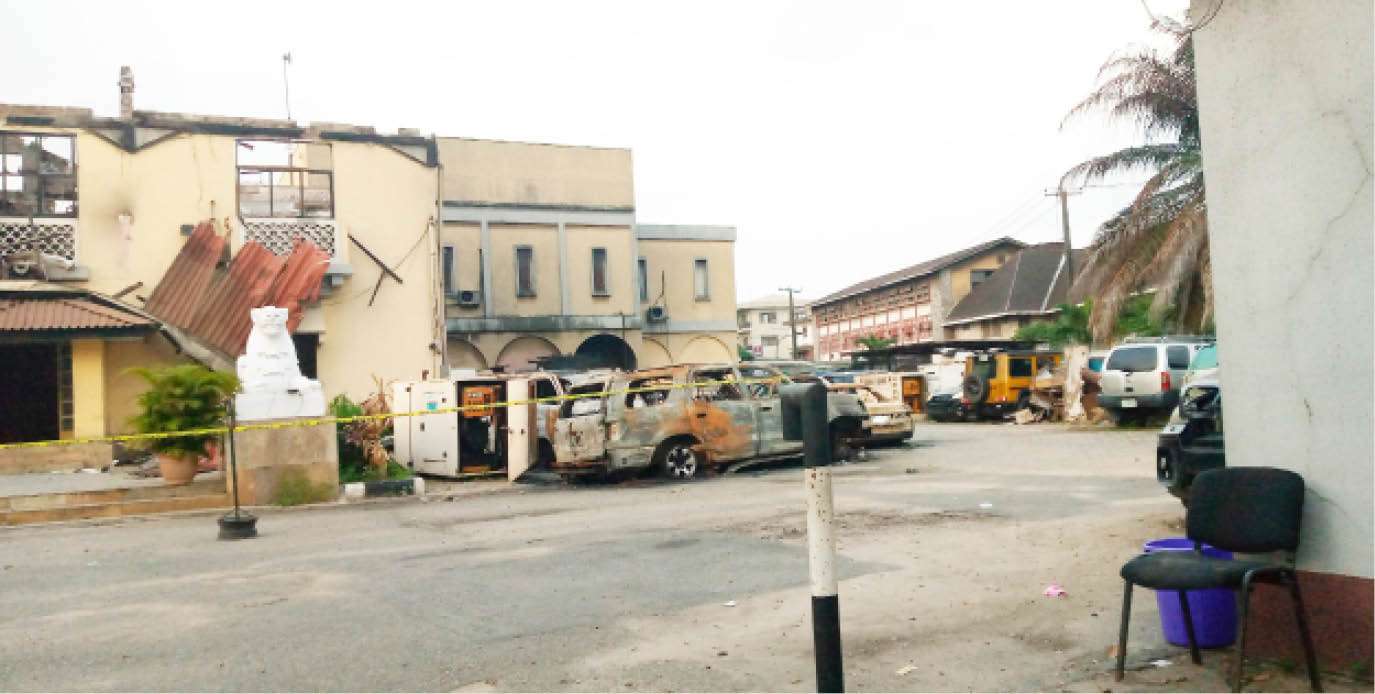The Lagos State judiciary suffered a major setback as a result of the #EndSARS protests but moves by lawyers to rebuild and furnish some of the affected courts like Lagos High Court in Igbosere and the adjacent Chief Magistrate Courts, which were burned by hoodlums, have raised ethical issues.
As the courts assigned some makeshift offices around Tafawa Balewa Square, Lagos Island, it was gathered that a senior lawyer donated over a dozen laptops directly to the affected courts and many more of such personal donations will continue to flow in.
- Tackle malaria like COVID-19, group tells FG
- Nigeria, 10 others to get $500m grant to fight TB, HIV, malaria
The #EndSARS protest, which was initially peaceful, turned violent after the Lekki shooting. Many people took advantage of the situation to loot several public and private properties.
In the Lagos courts, laptops, desktops, printers, scanners, photocopiers, file boxes, tables and chairs were carted away by suspected hoodlums, while the entire building were set on fire with casefiles, office furniture and other fittings destroyed in the process.
Before the arson, stakeholders described the Nigerian justice system as slow and requiring further reforms and investment to make the wheel of justice go faster.
Lawyers, many of them members of the nearest branch of the Nigerian Bar Association (NBA) in Lagos State, have been among those donating to re-equip the razed courts. The NBA has five branches in Lagos State.
According to Bayo Akinlade, a former chairman of NBA Ikorodu branch, the Lagos High Court Igbosere is one of the busiest courts in the country. About 70 per cent of the cases pending at the Chief Magistrate Courts are said to be criminal matters and the accused persons would be happy if the court remained in shambles.
However, reacting to the ethicality of donating to courts, a former General Secretary of the NBA, Mazi Afam Osigwe (SAN) said there is nothing wrong in lawyers making donations to assist the court, especially one that has suffered damage.
“You are not making a personal donation or to an individual but to an institution,” he said.
But Bayo Akinlade Esq said such a gesture may be viewed as an attempt to undermine the court, adding that it is the affected state judiciary that should reject such a gift as it offends the ethics of the profession. The donations should be made directly to the judiciary, and not to particular courtrooms.
“I will not advise donations to the judge or court directly but to the judiciary,” he said.
He added that the NBA Ikorodu branch had some time ago donated three standing fans to each court in Ikorodu, rewired the courts and built toilets.
Lagos-based lawyer Raymond Adekunle Olaiya said there was no way you can absolutely recuse a judge of being biased. Whether it is ethical or appropriate depends on the motive for giving and collecting such donation.
For his part, Wole Johnson Esq is of the view that there was nothing wrong with lawyers making donations to ensure judicial institutions are well funded.
Meanwhile, although the Lagos State government budgeted N3.2 billion for the Judiciary in 2020, which according to BudgIT was earmarked for among others, the Lagos State High Courts, Judicial Service Commission and the Multi Door Court House, that did not include the rehabilitation of courts under the current Legal Year.
Also, it is not certain if all the funds were raised and expended given the COVID-19 pandemic and the shutdown of the courts in Lagos and other parts of the country for three months.
Similarly, questions on whether the courts were insured have also been asked. Some sources said the courts were not insured, adding that even where they were, the insurance companies would not like to pay liability.
Findings by Daily Trust indicate that the affected courts are not ordinary courts because they are linked to the history of Lagos State and Nigerian judiciary in general. They were among the first courts built by the colonial masters. They were later rebuilt following modern architectural designs.
The Lagos High Court in Igbosere is situated beside the Court of Appeal which was established in 1963. This was the former Supreme Court of Nigeria established in 1954, before the apex court was moved to Abuja.
It was at the high court in Igbosere that the Interim National Government (ING), which was established by General Ibrahim Babangida in the aftermath of the annulment of the June 12, 1993 presidential election headed by Chief Ernest Shonekan, was declared illegal by now late Justice Dolapo Akinsanya, and other celebrated cases which shaped the country were decided.
The courts also host various cases involving lawyers from across the country.

 Join Daily Trust WhatsApp Community For Quick Access To News and Happenings Around You.
Join Daily Trust WhatsApp Community For Quick Access To News and Happenings Around You.


